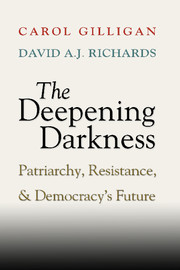Book contents
- Frontmatter
- Contents
- Acknowledgments
- Introduction and Overview
- Part One Roman Patriarchy: Entering the Darkness
- 1 Why Rome? Why Now?
- 2 Roman Patriarchy and Violence
- 3 Vergil on the Darkness Visible
- 4 Apuleius on Conversion
- 5 Augustine on Conversion
- Part Two Resistance Across Time and Culture
- Part Three Democracy's Future
- Conclusion
- Notes
- Bibliography
- Index
5 - Augustine on Conversion
Published online by Cambridge University Press: 01 September 2010
- Frontmatter
- Contents
- Acknowledgments
- Introduction and Overview
- Part One Roman Patriarchy: Entering the Darkness
- 1 Why Rome? Why Now?
- 2 Roman Patriarchy and Violence
- 3 Vergil on the Darkness Visible
- 4 Apuleius on Conversion
- 5 Augustine on Conversion
- Part Two Resistance Across Time and Culture
- Part Three Democracy's Future
- Conclusion
- Notes
- Bibliography
- Index
Summary
A radical shift separates the Christianity of the second century from that of the end of the fourth century, and no figure was more powerful in engineering this shift than Augustine of Hippo. The backdrop, decisively influential on the thought and life of Augustine, was the political decline of the Roman Empire itself, marked not only by bloody civil wars over the succession but also by the decisive political power of the Roman armies. As the armies proved increasingly unable to contain the barbarians on the borders of the empire, Rome was sacked in 410. This event shocked the Roman world and led to Augustine's work on The City of God, explaining why the Catholic Church was not responsible for this catastrophe.
Christianity had been a distinctly minority religious preference in the second century. Although it grew steadily after that, its dominance in the fourth century was due to two remarkable developments: first, the decision of Constantine in 311 that Christianity was to be the established church of the Roman empire, receiving massive state support and patronage continuously from then onward (except for the brief three-year reign of Julian the Apostate); and second, the decision of Theodosius in 391 that all pagan practices were to be repressed and that the state would use its coercive powers to support orthodox Christian views over heresies.
- Type
- Chapter
- Information
- The Deepening DarknessPatriarchy, Resistance, and Democracy's Future, pp. 102 - 118Publisher: Cambridge University PressPrint publication year: 2008
- 1
- Cited by



